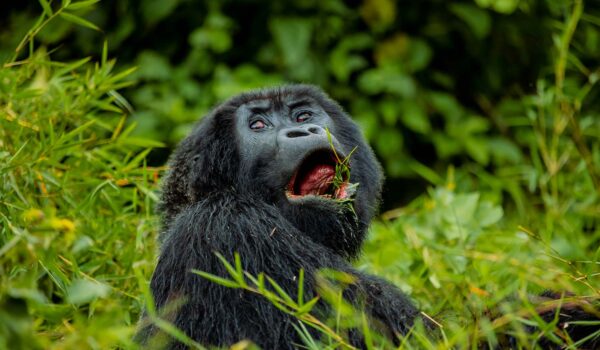Uganda Travel Advice
Uganda is a place full of rich culture, varied landscapes, and some of the world’s most amazing animal encounters. Uganda offers exploration and adventure, from the lush rainforests brimming with monkeys to the savannahs where lions prowl. This is a thorough travel guide to guarantee an enjoyable and secure trip to this East African treasure.
Planning for safari to Uganda, reach to us at Adventure in the wild safaris for your Uganda travel Advice. We have a team of experts that will provide you with all the relevant information you need to make that life changing journey to the ‘’Pearl of Africa’’.
-
Planning Your Itinerary
Uganda has a wide range of attractions to suit a variety of interests. Top places for wildlife aficionados include Kibale Forest National Park for chimpanzee tracking, Bwindi Impenetrable National Park, and Mgahinga Gorilla National Park for gorilla trekking. Game drives at Queen Elizabeth National Park and Murchison Falls National Park are great for seeing lions, elephants, and hippos for a traditional safari experience.
Jinja, the “Adventure city of East Africa,” situated near the Nile River’s source, and Kampala, Uganda’s vibrant city, are great destinations for anyone seeking cultural immersion. Adventuresome tourists may also hike the Rwenzori Mountains or visit Uganda’s crater lakes, such Lake Bunyonyi.
-
Visa and Entry Requirements
Uganda requires most travelers to obtain a visa, which can be done easily online through the e-Visa system. Alternatively, you may purchase a visa on arrival, but it’s best to check current entry policies before your trip. For those planning to visit multiple East African countries, consider the East Africa Tourist Visa, which grants entry to Uganda, Kenya, and Rwanda with one permit.
-
Health and Safety Precautions
Before traveling, ensure you are vaccinated against yellow fever, as it is required for entry. Additional recommended vaccinations include hepatitis A and B, typhoid, and rabies. Uganda is a malarial zone, so taking antimalarial medication and using mosquito repellent is advisable, especially in more rural areas.
Medical care in Uganda is adequate in major cities but may be limited in remote areas. Therefore, purchasing comprehensive travel insurance covering medical evacuation is highly recommended.
Regarding personal safety, Uganda is generally safe for tourists, with friendly locals and a stable political climate. However, as with any destination, stay vigilant, especially in crowded places and urban centers. It’s wise to keep valuables secure and avoid walking alone at night in unfamiliar areas.
-
Local Etiquette and Culture
The people of Uganda are hospitable and kind. It is crucial to greet people with a smile and consideration for regional traditions. Shaking hands is usual when greeting new people, and showing respect for seniors means nodding or bowing slightly. Wear modest clothing to prevent attracting undue attention or upsetting local sensibilities, particularly in rural regions and places of worship.
Respectful photography involves always getting someone is permission before shooting their picture. Avoid shooting photos in restricted places to avoid getting into problems since certain government or military locations, such bridges and border crossings, are off-limits to photography.
-
Gorilla and Chimpanzee Trekking Guidelines
Uganda is known for its unique primate experiences, but there are strict rules to protect the gorillas and chimpanzees. In order to ensure a safe and respectful interaction, trekkers must keep a safe distance from the primates, avoid making direct eye contact, and follow the rangers’ instructions at all times. The trekking experience can be physically taxing, as hikes can last for several hours over difficult terrain. Being prepared is essential, so make sure you are reasonably fit and wear the right gear, such as sturdy hiking boots, gloves, and rain gear, as the rainforest climate is unpredictable.
-
Best Time to Visit
Uganda’s climate is generally pleasant year-round, but the best time to visit for most activities is during the dry seasons, from December to February and June to September. These months offer favorable conditions for trekking, wildlife viewing, and outdoor activities. However, even during the dry seasons, some rain should be expected, particularly in the rainforests. The wet seasons (March-May and October-November) see fewer tourists, making it a less crowded time to visit, but some roads and trekking routes can be more challenging to navigate.
-
Money and Budgeting
The Ugandan Shilling (UGX) is the official currency, and while USD is widely accepted for larger transactions, local currency is needed for day-to-day purchases. ATMs are available in urban areas, but carrying some cash is recommended if you venture into remote regions. Credit cards are accepted in most hotels, restaurants, and shops in urban centers but may not be reliable in rural areas.
Budget-wise, Uganda can be an affordable destination, though gorilla trekking permits are costly. Luxury safari lodges and mid-range accommodations are available, but there are also budget options, especially for backpackers and budget-conscious travelers.
-
Transportation and Getting Around
Long distances and a variety of terrain are common while traveling around Uganda. Although public transportation, like as buses and matatus (shared taxis), is widely available, its congested circumstances may make it difficult for visitors. Joining scheduled excursions or renting a private car with a driver are common choices for a more pleasant trip. There are also domestic flights to a number of national parks, which may save travel time, you can schedule your domestic from Entebbe/Kajjasi airstrip landing in Kihihi for the travelers visiting Bwindi Forest which saves on the long road drive which lasts for about 9 -10 hours.
Road conditions may vary widely; in rural places, some roads are dirt and difficult to navigate during the rainy season. Always check the state of the roads before embarking on a self-drive safari.
-
Sustainable and Responsible Tourism
In terms of encouraging ecotourism and ethical travel, Uganda has achieved great progress. Make sure your trip has a beneficial impact on conservation efforts by treating animals with respect, reducing plastic usage, and selecting eco-friendly lodging that supports sustainable practices and employs locals. You may also help the local economy in the places you visit by buying souvenirs from fair-trade stores or directly from local craftspeople.
Uganda is a country known for its lively culture, amazing biodiversity, and beautiful beauty. Traveling here provides visitors a warm welcome from the Ugandan people as well as life-changing experiences with nature. Travelers visiting Uganda may have an interesting trip that respects the assets of this remarkable nation if they prepare carefully, follow local customs, and put safety first. Whether you visit Uganda for cultural discovery, savannah safaris, or gorilla trekking, its attractions will undoubtedly make a lasting impression on you.

